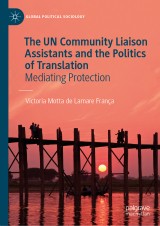Details

The UN Community Liaison Assistants and the Politics of Translation
Mediating ProtectionGlobal Political Sociology
|
CHF 153.50 |
|
| Verlag: | Palgrave Macmillan |
| Format: | |
| Veröffentl.: | 01.08.2024 |
| ISBN/EAN: | 9783031616945 |
| Sprache: | englisch |
| Anzahl Seiten: | 200 |
Dieses eBook enthält ein Wasserzeichen.
Beschreibungen
<p>This book explores how the United Nations (UN) attempts to stabilise and justify an ambivalent meaning of protection and its socio-political roles in the Protection of Civilians agenda. Negotiating between different notions of translation, the research takes the Community Liaison Assistants (CLAs) as an analytical prism to complexify the efforts to construct representations of protection. Created alongside the United Nations Stabilisation Mission in the Democratic Republic of the Congo (MONUSCO), the CLAs are local staff tasked with improving the mission's engagement with the local population, given their supposed linguistic-cultural skills. The CLAs are also part of the stabilisation turn in UN doctrine, adhering to counterinsurgency tactics and instrumentalising language and culture to obtain intelligence and support of the local population. Following a poststructuralist and postcolonial approach inspired mainly by the works of Jacques Derrida and Homi Bhabha, this book proposes deconstructing the representations applied to the CLAs by analysing the discourses presented in the UN reports and doctrinal documents.</p>
<p>Introduction.- The UN Community Liaison Assistants in the United Nations Discourse and the Local Turn Literature.- Found and Lost in Translation: Centering Protection Through Interpretations, Positionalities, and Tactics.- The Community Liaison Assistants and the Politics of Translation in UN Peace Operations’ Protection Discourses.- In-Between Magic and Mimicry: The Politics of the Community Liaison Assistants’ In-Visibility and the ‘Betrayals’ of Translating the Protection of Civilians Agenda.- Concluding Remarks.</p>
<p>Victoria Motta de Lamare França works as a Research Assistant at the Centre on Conflict, Development, and Peacebuilding (CCDP) and as a Teaching and Research Director at the Debates Pós-Coloniais e Decoloniais Extension Project. Currently, she is pursuing a PhD in International Relations and Political Science at the Graduate Institute of International and Development Studies.</p>
<p>This book explores how the United Nations (UN) attempts to stabilise and justify an ambivalent meaning of protection and its socio-political roles in the Protection of Civilians agenda. Negotiating between different notions of translation, the research takes the Community Liaison Assistants (CLAs) as an analytical prism to complexify the efforts to construct representations of protection. Created alongside the United Nations Stabilisation Mission in the Democratic Republic of the Congo (MONUSCO), the CLAs are local staff tasked with improving the mission's engagement with the local population, given their supposed linguistic-cultural skills. The CLAs are also part of the stabilisation turn in UN doctrine, adhering to counterinsurgency tactics and instrumentalising language and culture to obtain intelligence and support of the local population. Following a poststructuralist and postcolonial approach inspired mainly by the works of Jacques Derrida and Homi Bhabha, this book proposes deconstructing the representations applied to the CLAs by analysing the discourses presented in the UN reports and doctrinal documents.</p>
<p> </p>
<p>Victoria Motta de Lamare França works as a Research Assistant at the Centre on Conflict, Development, and Peacebuilding (CCDP) and as a Teaching and Research Director at the Debates Pós-Coloniais e Decoloniais Extension Project. Currently, she is pursuing a PhD in International Relations and Political Science at the Graduate Institute of International and Development Studies.</p>
<p> </p>
<p>Victoria Motta de Lamare França works as a Research Assistant at the Centre on Conflict, Development, and Peacebuilding (CCDP) and as a Teaching and Research Director at the Debates Pós-Coloniais e Decoloniais Extension Project. Currently, she is pursuing a PhD in International Relations and Political Science at the Graduate Institute of International and Development Studies.</p>
Looks at the UN's use of Community Liaison Assistants to improve engagement with locals in peacekeeping operations Examines the key role that language and culture play in counter-insurgency tactics Provides a poststructuralist and postcolonial account of the politics of protection and the politics of translation


















